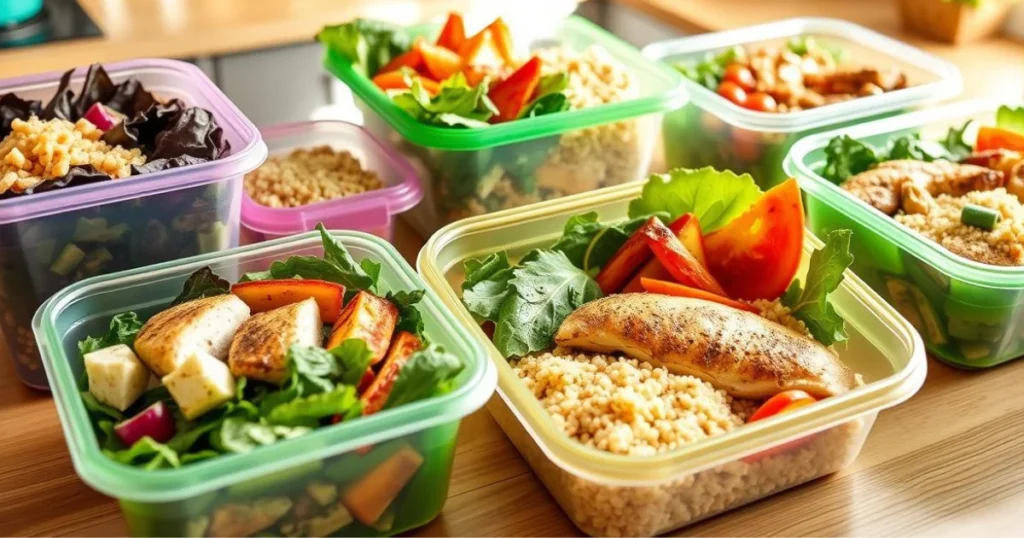No Sugar Diet: Your Ultimate Guide to a Healthier You
No Sugar Diet: As I sat in the doctor’s office, my heart was racing. The news was clear – my health was at risk, and sugar was the culprit. At that time, I saw the need for change. This was the start of my journey on the no-sugar diet, a path that has transformed my life.
If you’re reading this, you know the struggles of managing health in a world full of sugar. The afternoon energy crash, stubborn weight, and health concerns are all signs of too much sugar. But there’s a way to take back your vitality and control your cravings. Welcome to the no-sugar diet – your guide to a healthier, happier you.
Table of Contents
Understanding the Impact of Sugar on Your Health
Dealing with sugar’s effects on our health can be tough. It’s important to know how sugar addiction works and where hidden sugars are in our diet. This knowledge helps us understand the dangers of too much sugar.
The Science Behind Sugar Addiction
Sugar acts like an addictive drug, releasing dopamine in our brain’s reward center. This may establish a loop of desire and excessive consumption. It’s hard to stop once we’re hooked on sugar addiction.
Continued use of sugar habituates the brain. It increasingly requires more to achieve a sense of well-being. This makes it hard to stop eating sugar.
How Excess Sugar Affects Your Body
Too much sugar does more than just make us gain weight. It may result in significant health issues, such as:
- Insulin resistance and type 2 diabetes
- Fatty liver disease and other metabolic disorders
- Inflammation and increased risk of heart disease
- Disruption of gut microbiome and digestive problems
Hidden Sources of Sugar in Modern Diet
Finding and avoiding sugar in our diet is hard. It is concealed in several meals and beverages, even some that seem nutritious. Learning to read labels and spot hidden sugars is key to making better choices.
By understanding sugar addiction, its health effects, and where hidden sugars are, we can start living healthier. It represents progress toward a superior, more equitable existence.
Benefits of Following a No Sugar Diet
Starting a low-carb lifestyle by cutting down on sugar can bring many health benefits. You’ll see better energy, easier weight control, and less inflammation. These are just a few of the many advantages of a no-sugar diet.
One big plus is the energy boost you get. Without refined sugars, your blood sugar levels stay steady. This means you won’t feel tired and sluggish all the time. Instead, you’ll have more energy to get through your day.
A no-sugar diet may assist with weight control. By avoiding empty calories from added sugars, you’ll eat fewer calories. This can lead to weight loss. Plus, it can improve how your body handles insulin, helping you keep a healthy weight.
Another benefit is the reduction in body inflammation. This can help with joint pain and even improve symptoms of chronic diseases like heart disease and type 2 diabetes.
| Health Benefit | Impact |
|---|---|
| Improved Energy Levels | Stable blood sugar and sustainable energy |
| Better Weight Management | Calorie deficit and reduced inflammation |
| Reduced Inflammation | Relief from joint pain and chronic conditions |
Choosing a no-sugar diet can change your health for the better. By avoiding this harmful ingredient, you open up to a world of benefits. You’ll feel better and live a healthier, more vibrant life.
Getting Started: Preparing for Your Sugar-Free Journey
Starting a sugar-free meals journey is exciting and life-changing. It’s key to get ready by cleaning out your pantry, making a smart shopping list, and setting goals. This will help you build lasting clean eating habits.
Cleaning Out Your Pantry
Begin by checking your pantry and fridge. Get rid of processed foods, sugary snacks, and drinks that might stop you. It might feel hard, but it’s vital to make a space that helps you stay on track.
Essential Shopping List for Success
- Fresh produce, lean meats, whole grains, and good fats are examples of entire, unprocessed foods.
- Sweeteners derived from natural sources: monk fruit, stevia, honey, maple syrup.
- Herbs and spices to enhance taste without the use of sugar.
- Hydrating beverages: water, unsweetened tea, and infused waters.
- Healthy snacks: nuts, seeds, and low-sugar options.
Setting Realistic Goals
Switching to sugar-free meals needs a careful and slow plan. Don’t try to change everything at once. Start by slowly cutting down on sugar, trying new clean eating habits, or adding more exercise.
| Goal | Timeline | Measurable Outcome |
|---|---|---|
| Eliminate processed sugars | 4 weeks | Reduce added sugar intake by 50% |
| Increase consumption of whole, unprocessed foods | 8 weeks | Eat 5 servings of fruits and vegetables daily |
| Incorporate regular exercise | 12 weeks | Engage in 30 minutes of physical activity, five days a week. |
The path to a healthier, sugar-free meals lifestyle is long but worth it. By starting with these steps, you’re on your way to lasting change.
Common Challenges and How to Overcome Them
Starting a sugar-free lifestyle is a big change. You might face some tough spots along the way. But don’t worry, with the right approach and determination, you can get past these hurdles.
Sugar Cravings: One big challenge is sugar cravings. Your body might miss the sweetness it’s used to. To fight this, keep healthy snacks like fruit, nuts, or dark chocolate ready. Exercise can also help by releasing happy hormones.
Social Pressures: Going out and being around others can be hard too. It’s easy to give in to sugary treats when friends offer them. To deal with this, bring your own diet-friendly food or say no to sweets. Having supportive friends who understand your lifestyle changes helps a lot.
Remember, changing to a sugar-free life is a long-term effort. Enjoy your small wins and be gentle with yourself when you slip up. With the right mindset and strategies, you can beat these challenges and live a healthier, happier life.
Natural Alternatives to Refined Sugar
Starting a no-sugar diet means finding natural sweeteners. These natural sweeteners are better for you than refined sugar. You may indulge in sweets without worrying about your health because of them.
Approved Sweeteners on a No-Sugar Diet
Not all sweeteners are good for a no-sugar diet. Here are some sugar substitutes that are okay:
- Stevia – A plant-based sweetener from the stevia leaf, stevia has no calories. It’s great for many foods and drinks.
- Monk Fruit – Known as lo han guo, monk fruit sweetener is calorie-free. It’s a natural sugar alternative.
- Erythritol – A sugar alcohol found in fruits and fermented foods, erythritol has few calories. It doesn’t raise blood sugar much.
- Xylitol – From birch tree bark, xylitol is a sugar alcohol. It’s good for teeth and doesn’t raise blood sugar much.
Reading Labels and Making Smart Choices
When you’re on a no-sugar diet, reading labels is key. Watch out for hidden sugars like high fructose corn syrup and fruit juice concentrates. By checking labels, you can pick healthy foods that fit your diet.
Finding the right balance of natural sweeteners is key to a no-sugar diet. With some knowledge and effort, you can enjoy tasty, healthy alternatives to refined sugar.
Meal Planning on a Sugar-Free Diet
Starting a sugar-free diet means you need to plan your meals carefully. This will guarantee that you receive all the necessary nutrients. By getting into good meal prep habits, you’ll find it easier to stick to a healthier lifestyle.
When planning meals, focus on whole foods. Fill your kitchen with fresh fruits, lean meats, healthy oils, and whole grains. Stay away from sugary snacks and drinks that can mess up your diet.
Set aside some time each week for batch cooking. This can be making a big batch of chicken or veggies. These can be used in many meals. Also, portion out snacks so they’re easy to grab when you’re hungry.
- Try out new sugar-free recipes to keep your meals interesting.
- Prep meals in advance to save time and have healthy options ready.
- Make sure your meals have a good mix of protein, fats, and carbs for health.
Planning your meals and snacks ahead helps you stay on track with your sugar-free diet. You’ll feel more energetic, have better digestion, and lower your risk of serious health problems.

The Connection Between Sugar and Weight Management
Starting a weight loss journey means learning about sugar and how it affects your body. Insulin resistance results from too much sugar. This is a big part of why sugar and weight gain are linked.
Understanding Insulin Response
When you eat sugar, your body makes insulin. This hormone helps control blood sugar. Consuming too much sugar can make your cells less responsive to insulin. This can cause your blood sugar to rise, leading to more fat storage and weight gain.
Breaking the Sugar-Weight Gain Cycle
- Lowering your sugar intake can boost insulin sensitivity and improve metabolic health.
- Eating more whole foods and fewer processed ones helps keep your blood sugar stable. This supports lasting weight control.
- Adding exercise to your day helps insulin work better. It also aids in weight loss and better metabolic health.
Knowing how sugar, insulin, and weight are connected helps you fight sugar-related weight gain. You can start a healthier, lasting weight loss journey.
Sugar-Free Recipes and Meal Ideas
Living without sugar doesn’t mean you can’t enjoy tasty meals. Check out our sugar-free recipes that are easy to make and healthy. They will enable you to reach your health targets and make your taste sensations joyful.
Start your day with a sugar-free breakfast that provides a boost of energy. Try our creamy sugar-free overnight oats or a filling sugar-free breakfast frittata. It’s packed with fresh veggies and protein.
For lunch and dinner, find healthy cooking ideas that are sugar-free and delicious. Enjoy a refreshing sugar-free quinoa salad or a tasty sugar-free chicken stir-fry with colorful veggies.
And don’t forget about sugar-free desserts! Indulge in a decadent sugar-free chocolate avocado mousse or a creamy sugar-free chia pudding. Your taste buds will love it.
| Recipe | Serving Size | Prep Time | Nutritional Information |
|---|---|---|---|
| Sugar-Free Overnight Oats | 1 serving | 5 minutes | Calories: 300, Carbs: 35g, Protein: 12g, Fat: 10g |
| Sugar-Free Breakfast Frittata | 4 servings | 30 minutes | Calories: 220, Carbs: 8g, Protein: 18g, Fat: 13g |
| Sugar-Free Quinoa Salad | 6 servings | 20 minutes | Calories: 250, Carbs: 30g, Protein: 8g, Fat: 12g |
| Sugar-Free Chicken Stir-Fry | 4 servings | 25 minutes | Calories: 280, Carbs: 15g, Protein: 25g, Fat: 14g |
Check out our nutritious meals and enjoy sugar-free cooking. These tasty recipes let you enjoy flavorful dishes while staying healthy.
Exercise and Lifestyle Changes to Support Your Diet
Embarking on a no-sugar diet is a significant stride toward improved health. But it’s just the start. Adding regular exercise and healthy habits to your day is key. This way, you can support your diet with a whole-body approach to wellness.
Building Healthy Habits
Creating a steady exercise routine is vital for your no-sugar diet. Combine cardio exercises like walking or cycling with strength training to build muscle and boost your metabolism. Choose activities you love to make sticking to your routine easier and keep your healthy lifestyle on track.
Don’t forget about stress management. Stress can make you crave unhealthy foods and hurt your diet. Try yoga, meditation, or deep breathing to manage stress and improve your overall health.
Small changes in your daily life can also help a lot. Get enough sleep, drink plenty of water, and move more. A balanced approach that covers diet and lifestyle will help you reach your health goals.
Physical Activities That Complement Your Diet
- Brisk walking or jogging to boost cardiovascular fitness
- Strength training routines that promote muscular growth and metabolic rate enhancement
- Low-impact activities such as swimming or cycling help minimize stress on the joints
- Balance, flexibility, and awareness may be enhanced by Pilates and yoga
| Exercise | Benefits | Frequency |
|---|---|---|
| Brisk Walking | Cardiovascular health, weight management | 30-60 minutes, 3-5 times per week |
| Strength Training | Muscle building, increased metabolism | Performing full-body exercises two to three times weekly |
| Yoga | Flexibility, balance, stress reduction | 1-2 times per week, 30-60 minutes per session |

Managing Social Situations and Dining Out
Attending social events and eating out can be challenging on a no-sugar diet. But, with some planning, you can stick to your diet and still have fun with friends and family.
Strategies for Social Eating
- To ensure you have something to eat that is safe, bring a meal that does not include sugar.
- Tell the host about your diet and ask if they can make something for you.
- Fill your plate with healthy, sugar-free foods first to avoid sugary treats.
- Drink water or unsweetened drinks to keep your hands and mouth busy.
- Propose doing something active that doesn’t involve food.
Navigating Restaurant Menus
When eating out, choose wisely to fit your no-sugar diet. Here are some tips:
- Look over the menu and find dishes that are low in sugar or can be made sugar-free.
- Ask your server about ingredients and ask for changes if needed.
- Choose grilled, roasted, or steamed foods instead of fried or sauced ones.
- Stay away from sugary condiments, dressings, and sauces. Check if you can ask for them discreetly.
- End your meal with a sugar-free dessert like fresh fruit or a coffee with a sugar-free sweetener.
| Restaurant Choices | Sugar Content |
|---|---|
| Grilled Chicken Salad with Vinaigrette Dressing | Low |
| Baked Salmon with Roasted Vegetables | Low |
| Veggie Stir-Fry with Brown Rice | Moderate |
| Burger with Lettuce Wrap and Avocado | Moderate |
| Pasta with Tomato Sauce and Parmesan | Moderate |
By being proactive and talking about your diet, you can enjoy social events and dining out while keeping to your no-sugar diet. A bit of creativity and flexibility can help you have fun with others without giving up on your health goals.
Tracking Progress and Maintaining Motivation
Starting a no-sugar diet is a big step towards a healthier life. Success comes from monitoring your progress and staying motivated. Use the right tools and celebrate your wins to keep going and reach your health goals.
Tools for Success
It’s key to keep an eye on your progress to stay motivated and make smart choices. Here are some tools to help you:
- Food journals or mobile apps to log your diet and spot patterns
- Regular health check-ups to track important numbers like blood sugar and weight
- Fitness trackers or smartwatches to watch your activity and health
Celebrating Non-Scale Victories
The scale is important, but it’s not everything. Celebrate the good changes in your health, like:
- More energy and better sleep
- Improved digestion and less bloating
- Better skin and less inflammation
- Sharper mind and stronger emotions
Seeing these positive changes helps you feel accomplished and keeps you going on your no-sugar journey.
| Progress Tracking Tool | Benefit |
|---|---|
| Food Journal | Spot patterns and trends in your diet |
| Biometric Tracking | Keep an eye on blood sugar, cholesterol, and weight changes |
| Fitness Tracker | Track your activity and overall health |
Using these tools and celebrating your wins will help you stay motivated and reach your health goals. It’s all about tracking your progress well.
Conclusion
Discovering a no-sugar diet can change your life for the better. It’s a step towards a healthier and more sustainable lifestyle. By cutting down on refined sugars, you’ve made a big leap towards better health.
This guide has shown you the science behind sugar addiction and hidden sugars in our diets. You’ve also learned how too much sugar can harm your body. By choosing natural sweeteners and making smart food choices, you’ve taken charge of your health.
Keep moving forward on this journey, even though it’s not easy. Celebrate every small win, like feeling more energetic or losing weight. Surround yourself with people who support you, try new recipes, and enjoy the little victories. By focusing on your health and making sustainable choices, you’re paving the way for a lifetime of health transformation, a more sustainable lifestyle, and the long-term benefits that come with it.

